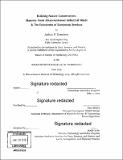Building nature conservation : masonry from alkali-activated industrial waste & the economics of ecosystem services
Author(s)
Dennison, Joshua E.(Joshua Elliot)
Download1117774454-MIT.pdf (4.927Mb)
Other Contributors
Massachusetts Institute of Technology. Institute for Data, Systems, and Society.
Technology and Policy Program.
Advisor
Elsa Olivetti.
Terms of use
Metadata
Show full item recordAbstract
India's soaring population elicits increased demand for construction materials and waste generation. Incumbent materials such as the fired clay brick demand high energy manufacturing processes and pose serious environmental and human health hazards. Separately, the landfilling and illegal disposal of industrial waste is unsustainable and growing rapidly along with population. To address both of these issues, we have developed a brick composed of 90% industrial waste that is superior to a traditional fired clay brick in environmental impact and comparable in cost while meeting the physical properties that structural code mandates. By transforming industrial waste into sustainable building materials through alkali-activation, we propose a solution to help alleviate the environmental, ecological, and human health impacts of India's housing crisis. Surge in material use leads not only to environmental impact from processing, manufacturing, and transportation, but also imposes an ecological burden via extraction of raw materials. This ecological deterioration can be accounted for by imputing values for the unmarketed values of ecosystem services--benefits to humans derived from working ecosystems--and captured in the material's price. This thesis looks at the life cycle impact of the novel alkali-activated masonry and traditional building materials, and also conducts an ecosystem service valuation to shed light on hidden ecological costs associated with material extraction. In concert with the technical analysis, this thesis proposes a framework to streamline the acknowledgment of environmental services into policy which could assist in ousting incumbent materials and the environmental harm associated with their development. Dormant potential lying in landfills can become an active solution to the region's population problem.
Description
Thesis: S.M. in Technology and Policy, Massachusetts Institute of Technology, School of Engineering, Institute for Data, Systems, and Society, 2019 Cataloged from PDF version of thesis. Includes bibliographical references (pages 49-53).
Date issued
2019Department
Massachusetts Institute of Technology. Institute for Data, Systems, and Society; Massachusetts Institute of Technology. Engineering Systems Division; Technology and Policy ProgramPublisher
Massachusetts Institute of Technology
Keywords
Institute for Data, Systems, and Society., Technology and Policy Program.